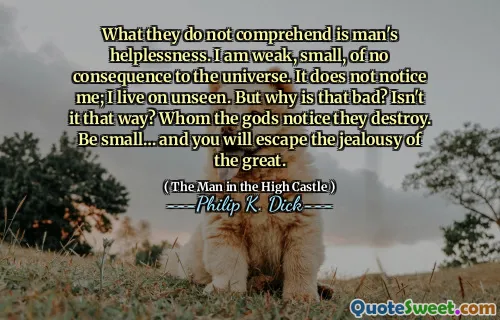
It was on the order of coin or stamp collecting; no rational explanation could ever be given. And high prices were being paid by wealthy collectors.
In Philip K. Dick's "The Man in the High Castle," the author explores the peculiarities of human behavior through the lens of collecting. The act of collecting, much like gathering coins or stamps, manifests without a logical basis. This underscores a deeper reflection on the motivations behind such pursuits, suggesting that they often stem from personal significance rather than objective value.
The narrative highlights the extravagant sums that affluent collectors are willing to spend, emphasizing how wealth can drive an obsession with acquiring rare items. This aspect raises questions about value, authenticity, and the intrinsic meaning one assigns to possessions, ultimately illustrating the complex relationship between people and their belongings.











